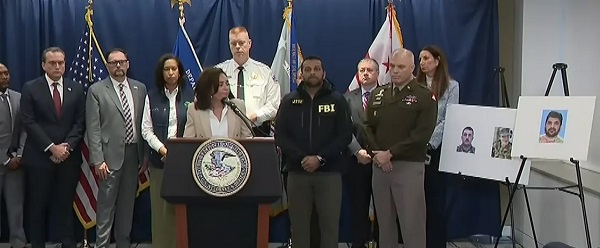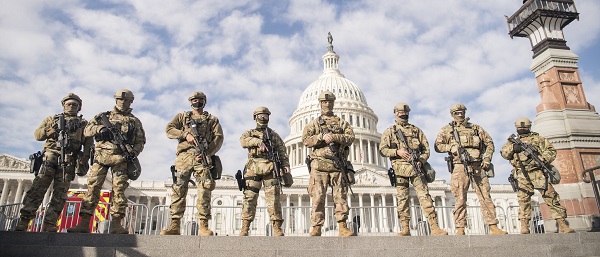COVID-19
Peckford: Hallelujah! Supreme Court of Canada to hear Newfoundland and Labrador charter case

From the Frontier Centre for Public Policy
This will allow the SCC to address novel questions about the scope of mobility rights in Canada and the extent to which the government can limit Canadians’ rights to move freely around the country.
In what can only be considered a surprise move the SCC has agreed to hear an appeal of a decision of the Supreme Court of Newfoundland. Surprise because the Newfoundland and Labrador Court of Appeal refused to hear the appeal of this exact case.
For the Appeal Court it was the all too familiar excuse of the whole thing being too moot for the Court.
But now the SCC has agreed to hear the case. The parties, Kimberly Taylor and The Canadian Civil Liberties Association appealed to the court.
Here is a copy of the Civil Liberties Press Release dated April 26, 2024:
“Arbitrary travel restrictions infringe on the mobility rights of Canadians. CCLA’s challenge of Newfoundland government’s Bill 38 will continue before the Supreme Court of Canada (SCC), so that Canadians have clear, predictable, and stable answers to fundamental questions affecting their basic mobility rights.”
Back in May 2020, CCLA challenged the constitutionality of the Newfoundland government’s Bill 38 before the province’s Supreme Court. This Bill provided for a travel ban between provinces and other restrictive measures in the context of the COVID-19 pandemic. CCLA asked the Court to declare Bill 38 in violation of s.6 (mobility rights), as well as other Charter rights. CCLA also argued that the law could not be saved by s.1, which says that limits on rights must be reasonable and demonstrably justified. In September of 2020, the province’s Supreme Court found that the travel ban did violate the s.6 Charter right to mobility, but that such infringement could be justified under s.1. CCLA pursued this case before the Newfoundland and Labrador Court of Appeal. In August of 2023, the Court of Appeal refused to settle the merits of the appeal under the motive that it was moot, since the ban had been lifted. This was done despite all the parties urging the Court of Appeal to decide the appeal on the merits.
CCLA is pleased to learn that the SCC just granted its application seeking leave to appeal in this case. This will allow the SCC to address novel questions about the scope of mobility rights in Canada and the extent to which the government can limit Canadians’ rights to move freely around the country. CCLA is grateful for the excellent pro bono work of Paul Pape, Shantona Chaudhury and Mitchell McGowan from Pape Chaudry LLP in this file.”
Like the Association I am pleased that the highest court is going to hear the case. One can only assume that it will not just issue a silly moot decision given that they could have let the Court of Appeal decision of Newfoundland stand and not hear the case.
I hope the highest court considers the following given it is high time for the Constitution of This Country to be fairly applied and interpreted as written.
Courts have not the power to rewrite this sacred document. They are not omnipotent. That is for the people through its elected representatives as expressed in Section 38 of the Constitution Act 1982 in which the Charter is located—the Amending Formula.
The intent of Section 1 Of the Charter was that it could only be applied in a war, insurrection, the state being threatened circumstance. As one of the First Ministers involved and whose signature is on the original Patriation Agreement I submit this point of view was what was operative at the time of the construction of this section. All remaining First Ministers whose names are on that document are no longer with us. Sadly, no court has called me to provide my view.
This intent is clear In Section 4 (2) of the Charter:
“In time of real or apprehended war, invasion or insurrection, a House of Commons may be continued by Parliament and a legislative assembly may be continued by the legislature beyond five years if such continuation is not opposed by the votes of more than one-third of the members of the House of Commons or the legislative assembly, as the case may be.”
So, decisions that have been made concerning the Charter should only be made in this context. Numerous court deliberations here and in many western jurisdictions have considered intent in determining the legitimacy of legislation. This is not novel or new.
Hence, a glaring, fundamental mistake has occurred in interpreting our Charter. The blatant omission of considering the opening words of the Charter in any interpretation of legislation by the Courts is an abuse of the Charter, our Constitution. Where is the power provided the courts to engage is such omission? Those words are:
“Whereas Canada is founded upon principles that recognize the supremacy of God and the rule of law:”
The one reference of which I am aware in the Courts literature to any consideration of the opening words relating to God was by an Alberta Judge in a lower court foolishly indicated that the creators of the words did not identify God as being a Christian God. All the creators, the First Ministers, were Christians —that’s all. What an insult to our history and traditions and the authors?
And this has been allowed to stand?
And what about the rule of law? Little if anything has been done in considering and interpreting this point.
As for Section 1 itself of the Charter. If one can get past the previous points, which is impossible, but let’s speculate: the court in question in Newfoundland, like the courts across the land, have disfigured, misinterpreted the wording of this section —-
Rights and freedoms in Canada
The Canadian Charter of Rights and Freedoms guarantees the rights and freedoms set out in it subject only to such reasonable limits prescribed by law as can be demonstrably justified in a free and democratic society.
What is of crucial importance is ‘demonstrably justify ‘and a free and democratic society ‘—-is it not? Many try and evade confronting these concepts by emphasizing ‘reasonable ‘. But ‘reasonable ‘is qualified, if you will, with ‘as can be demonstrably justified ‘and ‘in a free and democratic society.’ This was deliberate by the creators and authors of this section.
So, as we all know such reasonable demonstration would be a cost benefit analysis, a tool used frequently by Government in considering new policies or programs —and this case especially when sacred rights enshrined in the constitution were to be taken way!!! Yet, there was none! And what about the Provincial Emergency Management organizations that were already established in all the provinces with immediate expertise. Were they consulted? Not one!
No such attempt was made, and the Governments did not conduct even a cursory cost benefit review and the courts eagerly accepted the one-sided Government narrative. Yet experts like Lt. Colonel David Redman, who had been involved in Emergency Management and had written extensively on it were never consulted!
And ‘free and democratic society? Was there any meaningful engagement of the Parliament of Canada or the Legislative Assemblies —-not really, ——only to delegate power to unelected bureaucrats and relieve the politicians of direct responsibility. Where were the Parliamentary Committees? The sober consideration of all points of view in an open public session? Of independent science? Does not free and democratic society entail such deliberations?
And to those courts / governments who talk about little time—in this Newfoundland case it was 6 months before The Supreme Court of the Province ruled and 15 months for the Court of Appeal to issue a non-decision! So much for serving the people!
As for the concept of ‘mootness ‘that has been most dramatically used by the Federal Court and the Federal Court of Appeal and The Court of Appeal in Newfoundland? This is a construct of the court not the Constitution.
It denies a citizen the right to know whether a government action to which a citizen was subjected violates the Charter. Should a court idea of mootness, refusing to rule on whether a government action of only months before overruling the people’s right to know if their rights and freedoms were violated? Is this not the role of the Court? To protect the rights and freedoms of the citizens from Government overreach? That was and is the whole point of the Charter.
Whether the Government action is presently operative or not should be irrelevant, especially when millions of citizens were involved and especially when it involved rights and freedoms protected under the Charter, our Constitution. There may be a role for mootness if a frivolous matter is established but by any measure what we are discussing is anything but a frivolous matter, even though The Newfoundland Court of Appeal in calling the whole thing ‘moot ‘had the gall to find the Government’s action of denying rights ‘fleeting.’ Courts have abdicated their solemn responsibilities to the people in the exaggerated use of such Court constructed procedures.
So the highest court can go back to ‘first principles’, and examine intent and the opening words of the Charter and place them in full context in any interpretation of the Charter. If this were done then Section 1 of the Charter would not even be in play. Constructing a hypothetical i.e. considering Section 1 of the Charter during the so called ‘covid emergency’, well, even if we do, the Government and Court reasoning would have failed as demonstrated above.
There is an opportunity through this case as well as the one in which I am involved for our highest court to get it right——to return to the full constitution and re-establish the ‘supremacy of God and the rule of law, ‘the legitimate role of Parliament, to the plain meaning of demonstrably justify, and the importance of intent in interpreting our Charter.
Is the Supreme Court of Canada up to the challenge?
Will our Constitution, our democracy be restored?
The Honourable A. Brian Peckford P.C. is the last living First Minister who helped craft the Canadian Charter of Rights
Watch – Leaders on the Frontier: Brian Peckford on Saving Canada’s Democracy | Frontier Centre For Public Policy (fcpp.org) January 20, 2022
COVID-19
Canadian government seeking to destroy Freedom Convoy leader, taking Big Red from Chris Barber

From LifeSiteNews
The Crown claimed that ‘Big Red’ is an ‘offence-related property’ relating to Chris Barber’s involvement in the 2022 protests against Canada’s COVID mandates.
The Canadian government is still going after Freedom Convoy leader Chris Barber, this time hoping to seize his very livelihood.
The Justice Centre for Constitutional Freedoms (JCCF) has reported that it represented Barber during a November 26 hearing about the Crown’s attempt to take “Big Red,” Barber’s semi-truck. The Crown claimed that the vehicle is an “offence-related property” relating to Barber’s involvement in the 2022 protests against Canada’s COVID mandates.
Barber’s truck, a 2004 Kenworth long-haul, which he uses for business, was a focal point in the 2022 protests. He drove it to Ottawa, where it was parked for an extended period of time, but he complied when officials asked him to move it.
Barber’s lawyer, Diane Magas, said the Crown’s attempt to take away Barber’s livelihood is “not” in the spirit of laws in place regarding forfeiture.
“The impact of the forfeiture of ‘Big Red’, which is an essential part of the operation of Mr. Barber’s trucking business and is relied upon by Mr. Barber, his family, as well as employees, is not what Parliament had in mind when enacting those forfeiture provisions,” she said as per a JCCF press release.
“Especially considering the context of a political protest where the police told Mr. Barber where to park the truck and when Mr. Barber moved the truck after being asked to move it.”
The Freedom Convoy leader has talked about his truck, saying that, “Big Red is how I put food on the table.”
“I followed every instruction police gave me during the protest, and I never imagined the government would try to take the very truck I rely on to earn a living,” Barber continued.
A ruling regarding the Crown’s wish to seize Barber’s truck is expected to appear on December 19; however, the court case could drag into the new year.
RELATED: Freedom Convoy organizers sentenced to 18-month house arrest for role in protests
On October 7, 2025, after a long trial, Ontario Court Justice Heather Perkins-McVey sentenced Tamara Lich and Barber to 18 months’ house arrest. They had been declared guilty of mischief for their roles as leaders of the 2022 protest against COVID mandates, and as social media influencers.
Lich and Barber have filed appeals of their own against their house arrest sentences, arguing that the trial judge did not correctly apply the law on their mischief charges.
Government lawyers for the Crown have filed an appeal of the acquittals of Lich and Barber on intimidation charges.
Lich and Barber were declared guilty of mischief for their roles as leaders of the protest against COVID mandates in April 2022, and as social media influencers. The conviction came after a nearly two-year trial despite the non-violent nature of the popular movement.
COVID-19
Crown seeks to punish peaceful protestor Chris Barber by confiscating his family work truck “Big Red”

The Justice Centre for Constitutional Freedoms announces that the Ontario Court of Justice will hold a hearing at 10:00 a.m. ET on Wednesday, November 26 at 161 Elgin Street, Ottawa, regarding the Crown’s attempt to permanently seize “Big Red,” the 2004 Kenworth long-haul truck relied upon by peaceful Freedom Convoy protestor Chris Barber and his family trucking business.
Constitutional lawyer Diane Magas, who represents Mr. Barber, is opposing the forfeiture.
“The impact of the forfeiture of ‘Big Red’, which is an essential part of the operation of Mr. Barber’s trucking business and is relied upon by Mr. Barber, his family as well as employees, is not what Parliament had in mind when enacting those forfeiture provisions, especially considering the context of a political protest where the police told Mr. Barber where to park the truck and when Mr. Barber moved the truck after being asked to move it,” she said.
Mr. Barber, a Saskatchewan trucker and central figure in the peaceful 2022 Freedom Convoy, depends on this vehicle for his livelihood. The Crown alleges that his truck constitutes “offence-related property.”
The November 26 hearing will address the Crown’s application to seize the truck and will include evidence regarding ownership and corporate title. The Court will also consider an application filed earlier this year by Mr. Barber’s family, who are asserting their rights as interested third parties and seeking to prevent the loss of the vehicle.
Mr. Barber was found guilty of mischief and counselling others to breach a court order following the peaceful Freedom Convoy protest, despite his consistent cooperation with law enforcement and reliance on legal advice during the events of early 2022. At sentencing, the Court acknowledged that he “came with the noblest of intent and did not advocate for violence,” emphasizing that Mr. Barber encouraged calm and compliance.
Mr. Barber said, “‘Big Red’ is how I put food on the table. I followed every instruction police gave me during the protest, and I never imagined the government would try to take the very truck I rely on to earn a living.”
-

 Alberta11 hours ago
Alberta11 hours agoFrom Underdog to Top Broodmare
-

 armed forces2 days ago
armed forces2 days ago2025 Federal Budget: Veterans Are Bleeding for This Budget
-

 Alberta1 day ago
Alberta1 day agoAlberta and Ottawa ink landmark energy agreement
-

 Artificial Intelligence2 days ago
Artificial Intelligence2 days agoTrump’s New AI Focused ‘Manhattan Project’ Adds Pressure To Grid
-

 International2 days ago
International2 days agoAfghan Ex–CIA Partner Accused in D.C. National Guard Ambush
-

 Carbon Tax2 days ago
Carbon Tax2 days agoCanadian energy policies undermine a century of North American integration
-

 International1 day ago
International1 day agoIdentities of wounded Guardsmen, each newly sworn in
-

 International2 days ago
International2 days agoTrump Admin Pulls Plug On Afghan Immigration Following National Guard Shooting





